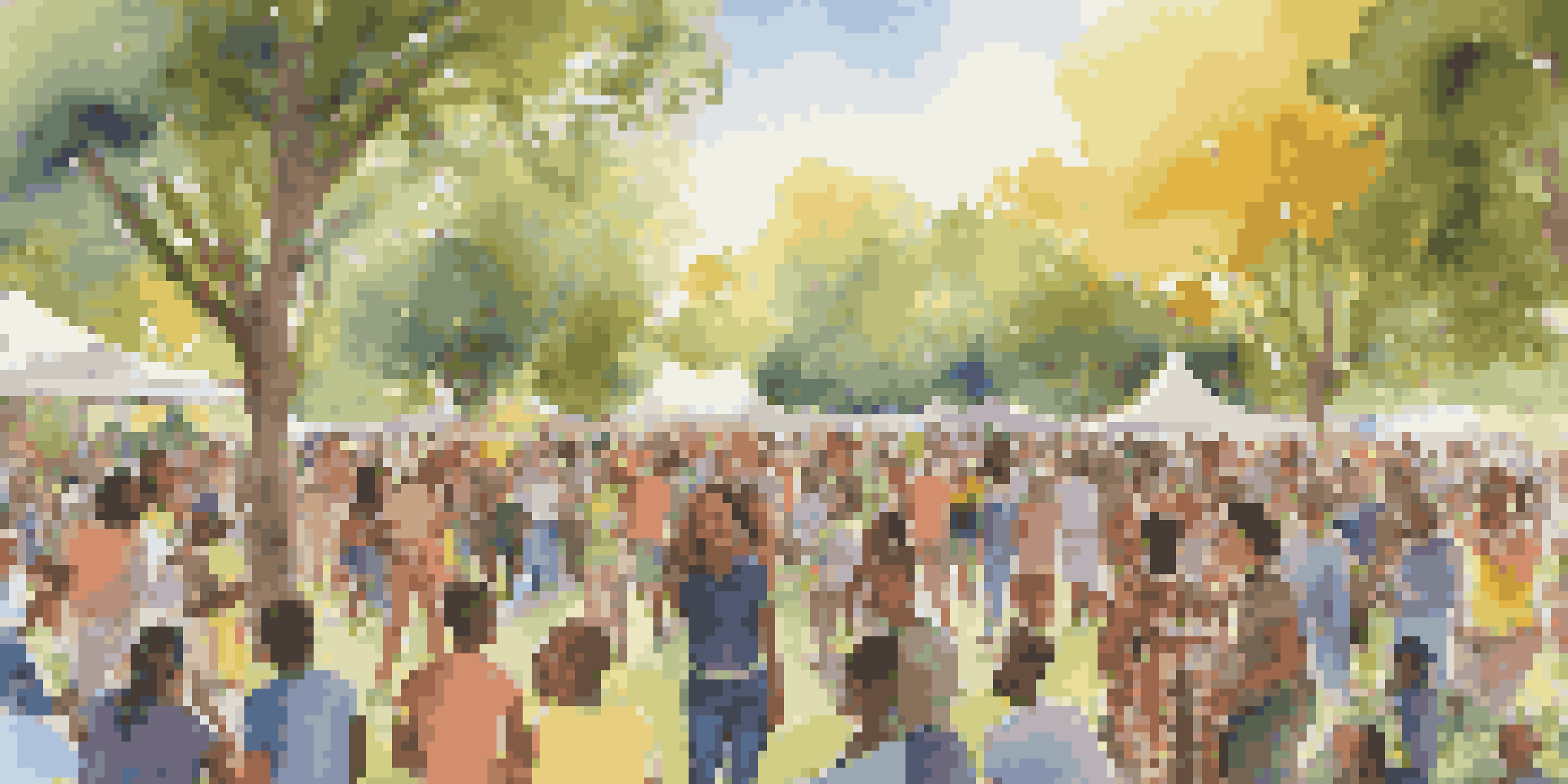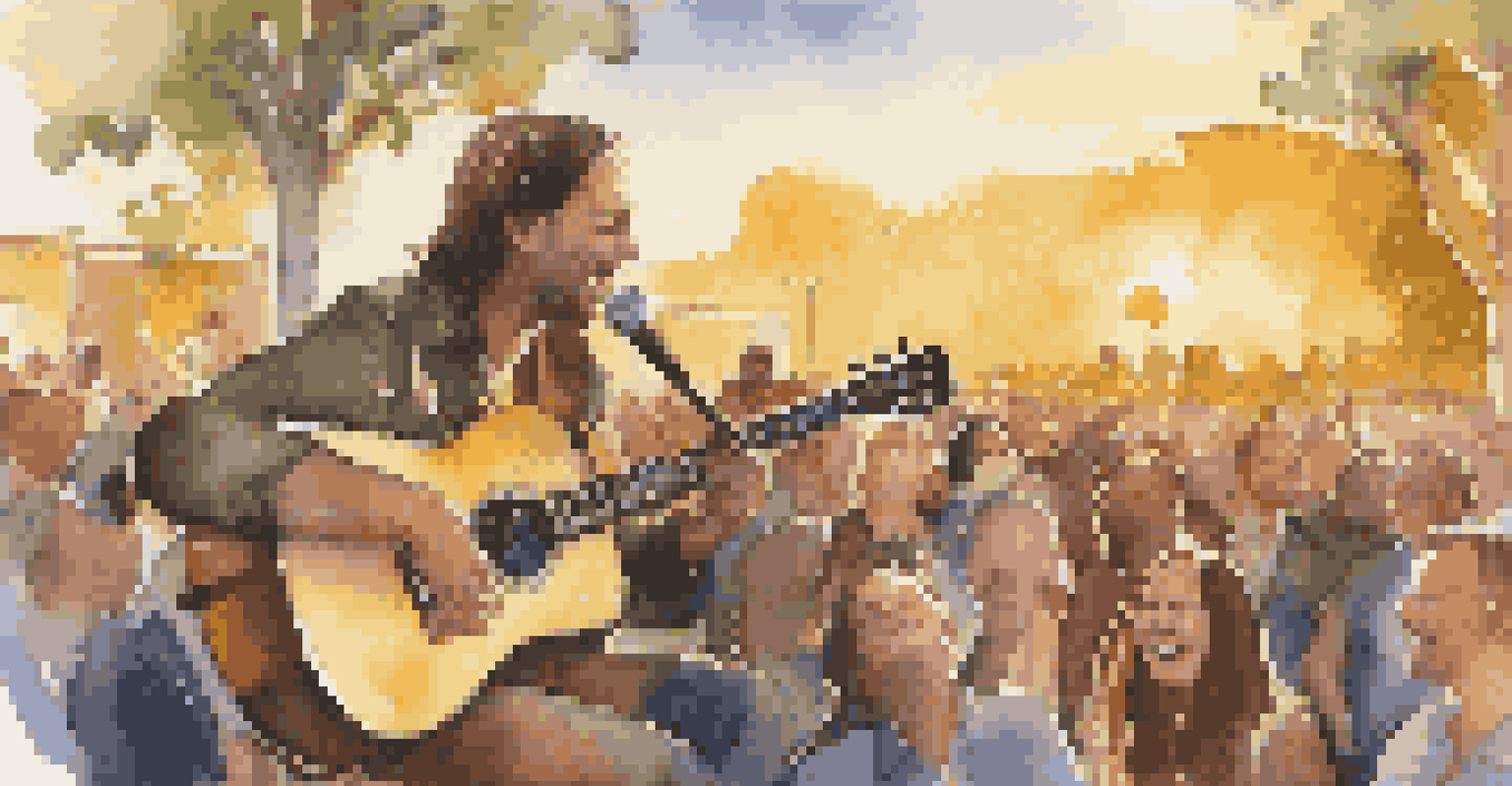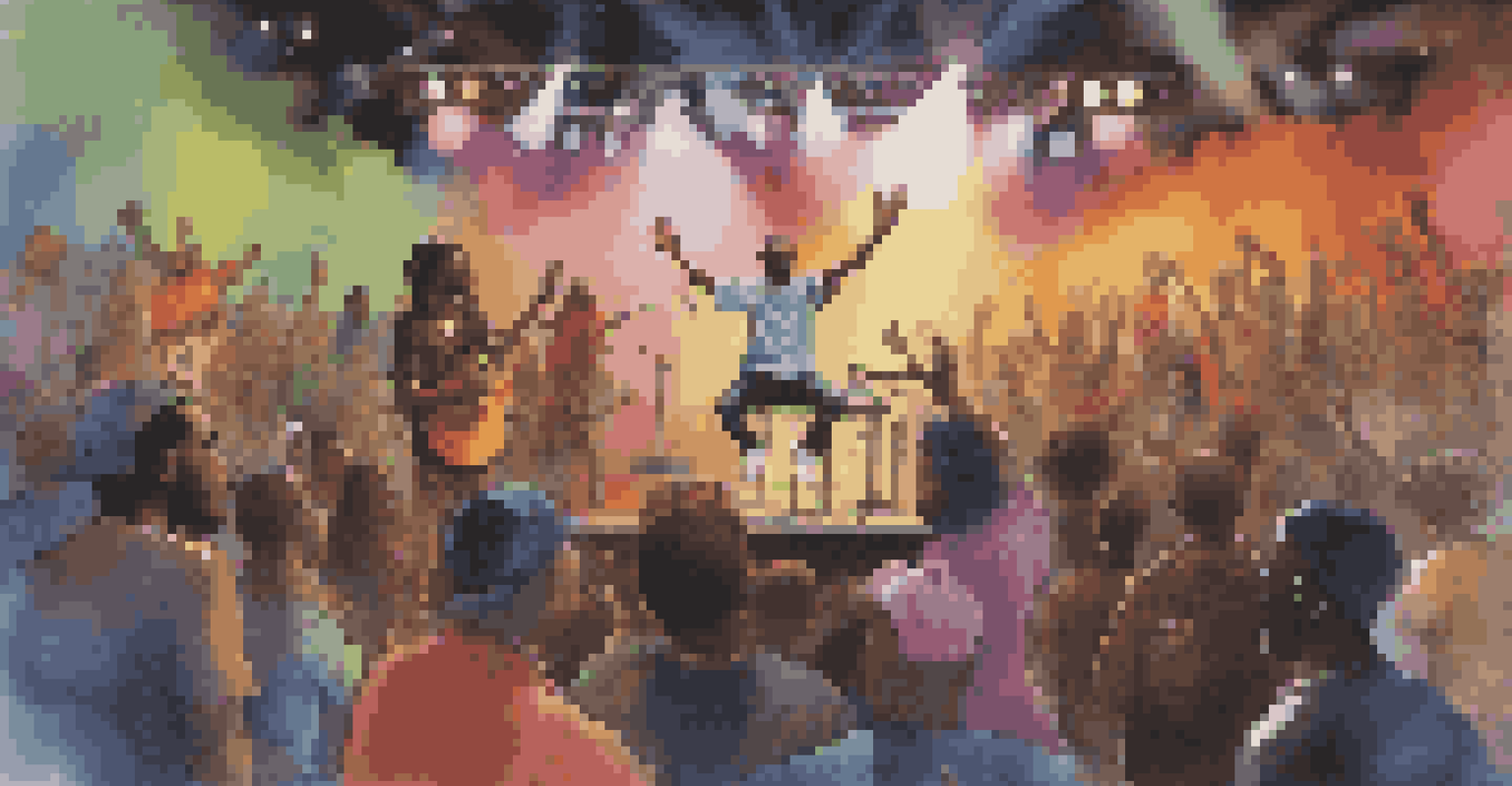The Role of Music in Community Organizing and Activism

Music as a Unifying Force in Communities
Music has a unique ability to bring people together, transcending individual differences. When communities gather around shared songs, they create a sense of belonging and solidarity. This unifying power is especially vital in activism, where collective voices amplify messages of change.
Music can change the world because it can change people.
For example, during the Civil Rights Movement, songs like 'We Shall Overcome' became anthems that united people in their fight for equality. These melodies not only inspired hope but also fostered camaraderie among activists. In this way, music acts as a powerful tool for community cohesion.
When people sing together, they forge emotional connections, making them more likely to engage in collective action. Thus, music serves as a catalyst for mobilization, transforming individual feelings into collective movements.
Historical Impact of Music in Activism
Throughout history, music has played a pivotal role in various social movements. From the labor rights chants of the early 20th century to the protest songs of the Vietnam War, each era has seen artists use their platforms to advocate for change. These songs often capture the emotions and struggles of the times, resonating with listeners and inspiring action.

Take Bob Dylan's 'The Times They Are a-Changin' as an example; it became an anthem for a generation seeking social reform. Such songs not only reflect societal issues but also encourage listeners to take a stand. By weaving social commentary into accessible melodies, musicians have historically galvanized public opinion.
Music Unites Communities
Music fosters a sense of belonging and solidarity, acting as a powerful tool for community cohesion and collective action.
This rich tapestry of musical activism highlights the importance of art in shaping cultural narratives. As movements evolve, so too does the music, showcasing its dynamic role in driving social change.
Creating Emotional Resonance through Music
One of music's most profound effects is its ability to evoke emotions. This emotional resonance can be a powerful motivator for action, as people often feel compelled to respond when moved by a song. Whether it’s joy, anger, or sadness, these feelings can spur individuals to join a cause or support a movement.
The role of a musician is not to play what you can play, but to play what you cannot play.
For instance, the haunting melodies of protest songs can stir feelings of empathy and urgency, prompting listeners to reflect on their own roles in societal issues. This connection between emotion and action is critical in community organizing, where passion drives participation.
By harnessing this emotional power, activists can create compelling narratives that resonate with diverse audiences. Thus, music becomes not just entertainment but a vital element in crafting and communicating messages of change.
Music as a Tool for Education and Awareness
Beyond its emotional impact, music serves as an educational tool, raising awareness about pressing social issues. Songs often incorporate storytelling elements that inform listeners about injustices, history, and cultural narratives. This engaging format can be more effective than traditional education methods, particularly for younger audiences.
For example, the song 'Fight the Power' by Public Enemy addresses systemic racism and encourages listeners to challenge the status quo. By embedding critical messages within catchy tunes, artists can spark curiosity and motivate audiences to learn more about issues that matter.
Music's Role in Activism
Throughout history, music has inspired social movements, capturing emotions and encouraging listeners to advocate for change.
In this way, music not only entertains but also enlightens, fostering a more informed and engaged community. This educational aspect reinforces the idea that music is integral to activism, as it empowers individuals with knowledge and inspires action.
Local Music Scenes and Their Activist Impact
Local music scenes play a crucial role in grassroots organizing. They provide a platform for emerging artists to express their views and rally support for local causes. By hosting benefit concerts or community events, these musicians can directly engage with their audiences, fostering a sense of local activism.
For instance, a local band might organize a concert to support a community garden initiative. This not only raises funds but also raises awareness of environmental issues within the community. Such events create a tangible connection between music and activism, highlighting how local scenes can spur meaningful change.
Additionally, these grassroots efforts can inspire larger movements, as the energy and passion generated at local events often ripple outwards. In this way, local music becomes a powerful driver of community engagement and activism.
The Role of Digital Platforms in Music Activism
In today's digital age, music activism has taken on new dimensions through social media and streaming platforms. Artists can now share their messages with global audiences, leveraging the power of the internet to amplify their voices. This accessibility enables grassroots movements to gain traction and build momentum quickly.
For example, songs that address social justice issues can go viral, reaching millions and sparking conversations worldwide. This phenomenon demonstrates how digital platforms can democratize activism, allowing diverse voices to be heard. It also empowers listeners to engage with causes they care about from anywhere in the world.
Digital Platforms Amplify Voices
In the digital age, artists leverage social media and streaming to share activist messages globally, democratizing the reach of their music.
As a result, music continues to evolve as a tool for activism, adapting to the changing landscape of communication. This digital revolution has broadened the reach of activist music, reinforcing its role as a catalyst for change in contemporary society.
Collaborations and Cross-Genre Activism
Collaborations between artists from different genres can amplify activist messages in powerful ways. When musicians from various backgrounds come together, they create a rich tapestry of sound that can reach diverse audiences. This cross-genre approach not only enhances the music but also broadens its impact.
For instance, the collaboration between hip-hop artists and folk musicians can merge storytelling with rhythm, attracting listeners from different demographics. This fusion often leads to innovative ways of addressing social issues, making the music even more relatable and impactful.

Such partnerships highlight the versatility of music as a form of activism. By blending styles and influences, artists can create an inclusive space that encourages dialogue and action, reinforcing the idea that music knows no boundaries when it comes to advocating for change.